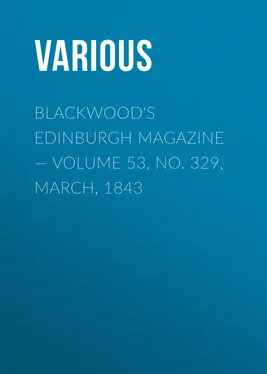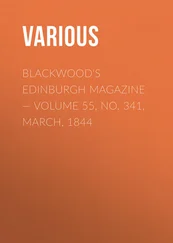Various - Blackwood's Edinburgh Magazine — Volume 53, No. 329, March, 1843
Здесь есть возможность читать онлайн «Various - Blackwood's Edinburgh Magazine — Volume 53, No. 329, March, 1843» — ознакомительный отрывок электронной книги совершенно бесплатно, а после прочтения отрывка купить полную версию. В некоторых случаях можно слушать аудио, скачать через торрент в формате fb2 и присутствует краткое содержание. Издательство: Иностранный паблик, Жанр: foreign_antique, periodic, foreign_edu, на английском языке. Описание произведения, (предисловие) а так же отзывы посетителей доступны на портале библиотеки ЛибКат.
- Название:Blackwood's Edinburgh Magazine — Volume 53, No. 329, March, 1843
- Автор:
- Издательство:Иностранный паблик
- Жанр:
- Год:неизвестен
- ISBN:нет данных
- Рейтинг книги:3 / 5. Голосов: 1
-
Избранное:Добавить в избранное
- Отзывы:
-
Ваша оценка:
- 60
- 1
- 2
- 3
- 4
- 5
Blackwood's Edinburgh Magazine — Volume 53, No. 329, March, 1843: краткое содержание, описание и аннотация
Предлагаем к чтению аннотацию, описание, краткое содержание или предисловие (зависит от того, что написал сам автор книги «Blackwood's Edinburgh Magazine — Volume 53, No. 329, March, 1843»). Если вы не нашли необходимую информацию о книге — напишите в комментариях, мы постараемся отыскать её.
Blackwood's Edinburgh Magazine — Volume 53, No. 329, March, 1843 — читать онлайн ознакомительный отрывок
Ниже представлен текст книги, разбитый по страницам. Система сохранения места последней прочитанной страницы, позволяет с удобством читать онлайн бесплатно книгу «Blackwood's Edinburgh Magazine — Volume 53, No. 329, March, 1843», без необходимости каждый раз заново искать на чём Вы остановились. Поставьте закладку, и сможете в любой момент перейти на страницу, на которой закончили чтение.
Интервал:
Закладка:
It will not, we trust, be considered out of place to give our readers a brief sketch of the history of the Russian literature; the origin, growth, and fortunes of which are marked by much that is peculiar. In doing this we shall content ourselves with noting, as briefly as possible, the events which preceded and accompanied the birth of letters in Russia, and the evolution of a literature not elaborated by the slow and imperceptible action of time, but bursting, like the armed Pallas, suddenly into light.
In performing this task, we shall confine our attention solely to the department of Prose Fiction, looking forward meanwhile with anxiety, though not without hope, to a future opportunity of discussing more fully the intellectual annals of Russia.
In the year of redemption 863, two Greeks of Thessalonika, Cyril 3 3 Cyril was the ecclesiastical or claustral name of this important personage, his real name was Constantine.
and Methodius, sent by Michael, Emperor of the East, conferred the precious boon of alphabetic writing upon Kostisláff, Sviatopólk, and Kótsel, then chiefs of the Moravians.
The characters they introduced were naturally those of the Greek alphabet, to which they were obliged, in order to represent certain sounds which do not occur in the Greek language, 4 4 For instance, the j , (pronounced as the French j ), ts, sh, shtsh, tch, ui, yä . As the characters representing these sounds are not to be found in the "case" of an English compositor, we cannot enter into their Oriental origin.
to add a number of other signs borrowed from the Hebrew, the Armenian, and the Coptic. So closely, indeed, did this alphabet, called the Cyrillian, follow the Greek characters, that the use of the aspirates was retained without any necessity.
These characters (with the exception of a few which are omitted in the Russian) varied surprisingly little in their form, 5 5 Not to speak of the capitals, the γ, δ, ζ, κ, λ, μ, ο, π, ρ, ς, φ, χ, θ, have undergone hardly the most trifling change in form; ψ, ξ, ω, though they do not occur in the Russian, are found in the Slavonic alphabet. The Russian pronunciation of their letter B, which agrees with that of the modern Greeks, is V, there being another character for the sound B.
and perhaps without any change whatever in their vocal value, compose the modern alphabet of the Russian language; an examination of which would go far, in our opinion, to settle the long agitated question respecting the ancient pronunciation of the classic languages, particularly as Cyril and his brother adapted the Greek alphabet to a language totally foreign from, and unconnected with, any dialect of Greek.
In this, as in all other languages, the translation of the Bible is the first monument and model of literature. This version was made by Cyril immediately after the composition of the alphabet. The language spoken at Thessalonika was the Servian: but from the immense number of purely Greek words which occur in the translation, as well as from the fact of the version being a strictly literal one, it is probable that the Scriptures were not translated into any specific spoken dialect at all; but that a kind of mezzo-termine was selected—or rather formed—for the purpose. What we have advanced derives a still stronger degree of probability from the circumstance, that the Slavonic Bible follows the Greek construction . This Bible, with slight changes and corrections produced by three or four revisions made at different periods, is that still employed by the Russian Church; and the present spoken language of the country differs so widely from it, that the Slavonian of the Bible forms a separate branch of education to the priests and to the upper classes—who are instructed in this dead language, precisely as an Italian must study Latin in order to read the Bible.
Above the sterile and uninteresting desert of early Russian history, towers, like the gigantic Sphynx of Ghizeh over the sand of the Thebaid, one colossal figure—that of Vladímir Sviatoslávitch; the first to surmount the bloody splendour of the Great Prince's bonnet 6 6 The crown was not worn by the ancient Russian sovereigns, or "Grand Princes," as they were called; the insignia of these potentates was a close skull-cap, called in Russian shápka, bonnet; many of which are preserved in the regalia of Moscow. This bonnet is generally surrounded by the most precious furs, and gorgeously decorated with gems.
with the mildly-radiant Cross of Christ.
From the conversion to Christianity of Vladímir and his subjects—passing over the wild and rapacious dominion of the Tartar hordes, which lasted for about 250 years—we may consider two languages, essentially distinct, to have been employed in Russia till the end of the 17th century—the one the written or learned, the other the spoken language.
The former was the Slavonian into which the Holy Scriptures were translated: and this remained the learned or official language for a long period. In this—or in an imitation of this, effected with various degrees of success—were compiled the different collections of Monkish annals which form the treasury whence future historians were to select their materials from among the valuable, but confused accumulations of facts; in this the solemn acts of Government, treaties, codes, &c., were composed; and the few writings which cannot be comprised under the above classes 7 7 For instance, sermons, descriptions, voyages and travels, &c. Two of the last-mentioned species of works are very curious from their antiquity. The Pilgrimage to Jerusalem of Daniel, prior of a convent, at the commencement of the 12th century; and the Memoirs of a Journey to India by Athanase Nikítin, merchant of Tver, made about 1470.
were naturally compiled in the language, emphatically that of the Church and of learning.
The sceptre of the wild Tartar Khans was not, as may be imagined, much allied to the pen; the hordes of fierce and greedy savages which overran, like the locusts of the Apocalypse, for two centuries and a half the fertile plains of central and southern Russia, contented themselves with exacting tribute from a nation which they despised probably too much to feel any desire of interfering with its language; and the dominion of the Tartars produced hardly any perceptible effect upon the Russian tongue. 8 8 The only traces left on the language by the Tartar domination are a few words, chiefly expressing articles of dress.
It is to the reign of Alexéi Mikháilovitch, who united Little Russia to Muscovy, that we must look for the germ of the modern literature of the country: the language had begun to feel the influence of the Little Russian, tinctured by the effects of Polish civilization, and the spirit of classicism which so long distinguished the Sarmatian literature.
The impulse given to this union, of so momentous an import to the future fortunes of the empire, at the beginning of the year 1654, would possibly have brought forth in course of time a literature in Russia such as we now find it, had not the extraordinary reign, and still more extraordinary character, of Peter the Great interposed certain disturbing—if, indeed, they may not be called in some measure impeding—forces. That giant hand which broke down the long impregnable dike which had hitherto separated Russia from the rest of Europe, and admitted the arts, the learning, and the civilization of the West to rush in with so impetuous a flood, fertilizing as it came, but also destroying and sweeping away something that was valuable, much that was national—that hand was unavoidably too heavy and too strong to nurse the infant seedling of literature; and the command and example of Peter perhaps rather favoured the imitation of what was good in other languages, than the production of originality in his own.
Читать дальшеИнтервал:
Закладка:
Похожие книги на «Blackwood's Edinburgh Magazine — Volume 53, No. 329, March, 1843»
Представляем Вашему вниманию похожие книги на «Blackwood's Edinburgh Magazine — Volume 53, No. 329, March, 1843» списком для выбора. Мы отобрали схожую по названию и смыслу литературу в надежде предоставить читателям больше вариантов отыскать новые, интересные, ещё непрочитанные произведения.
Обсуждение, отзывы о книге «Blackwood's Edinburgh Magazine — Volume 53, No. 329, March, 1843» и просто собственные мнения читателей. Оставьте ваши комментарии, напишите, что Вы думаете о произведении, его смысле или главных героях. Укажите что конкретно понравилось, а что нет, и почему Вы так считаете.












